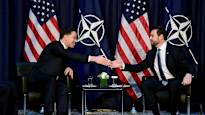Ukraine President Volodymyr Zelenskyi At the Munich Safety Conference, he urged Europe to become in his defense and establish his own army.
Many others also demanded that they become upset. Finns, NATO Secretary -General, Swedes, EU representatives.
In Munich, security policy leaders and advisors have frantically wondered how to act in a new situation where Europe has drifted.
Although trying to prepare for the change of US President in Europe, the situation was surprised. The Munich meeting revealed that the European countries had little ready -made ideas on the Ukraine’s peace talks, security guarantees or potential troops and Europe’s own defense.
It was also clear in the week that new US leaders will talk about what ever. Trump advisor at the Munich Security Conference Keith Kellogg There has been a so -called voice of reason and an important link to Europeans – including the Finns – to the new US administration. However, he does not seem to be the one that Trump listens to.
European defense solution It’s been NATO.
NATO may be in a new political situation a wing truck because of the new president of the US Donald Trump The movements are unpredictable. The United States will continue to have a leading position in NATO.
President Alexander Stubbin Still, no one is based on Europe.
– The defense is primarily organized nationally and alternative through NATO.
There is no point in building some kind of overlapping, Stubb said.
NATO command structures and systems exist, and the construction of the like would be both slow and useless.
A few days are too A short time to make decisions about how security will be guaranteed in the future. However, some things have become clear this week.
First of all, it is clear that NATO will change considerably.
After 75 years, NATO will force more European. European countries must raise their defense as the United States focuses on their own safety.
Europe has never been in a situation where there is aggressive Russia in the East and the United States in the West that has begun to bully its ally.
During their first European visit to Europe this week, new leaders in the United States introduced a angular and live speech style. It culminated in the Munich Safety Conference with the speech of Vice President JD Vance, where he laid European values, democracy and freedom of expression in the familiar style of the radical right.
An experienced French diplomat has now called a livestock as a watershed in modern European history.
The depth of the US change cannot yet be evaluated. There is a Foreign Minister in the country Elina Valtonen “Pack mixed up”. The Senate still has a strong group that supports US NATO participation.
Another thing that Europeans agree is to strengthen Europe’s own defense. However, it is not that simple.
Europe will have to pay More about defense.
The United States demands five percent of GDP from European countries to defense, while European countries’ own estimates have previously moved around 3 %. A new assessment after the US announcement has not yet been made or brought.
European states have many more money holes than weapons. Until now, it has been difficult to justify additional money for weapons and army in countries where Russia’s threat is not acute. If there is some kind of peace in Ukraine, the war and the need for defense are again out of mind.
Soldiers are needed more. They may also be needed to replace the troops now in the US Europe, which currently has about 80,000 soldiers. If all or some of them move to something where the United States considers its presence more necessary, the vacuum must be filled.
Defense industry must be launched. Although there has been a war in Ukraine and a shortage of ammunition, only some of the factories have dared to invest in additional production.
Until now, Europe has suffered from the fact that different countries prefer their own defense industry. That’s why there are many different systems in Europe, which is not effective. Changing this would require a huge change of attitude.
NATO in crisis moods held The Ministry of Defense and the Munich meeting have launched thinking.
While different models have been feverishly considered, many leaders have wanted to reassure and tell the United States as a partner. At the same time, however, the situation has been said to be serious and tough.
According to Stubb, the problem is that Europe talks a lot and does a little.
It has not yet become clear who the European leaders will convince everyone about the need for a common line and take action. Who begins to start?
